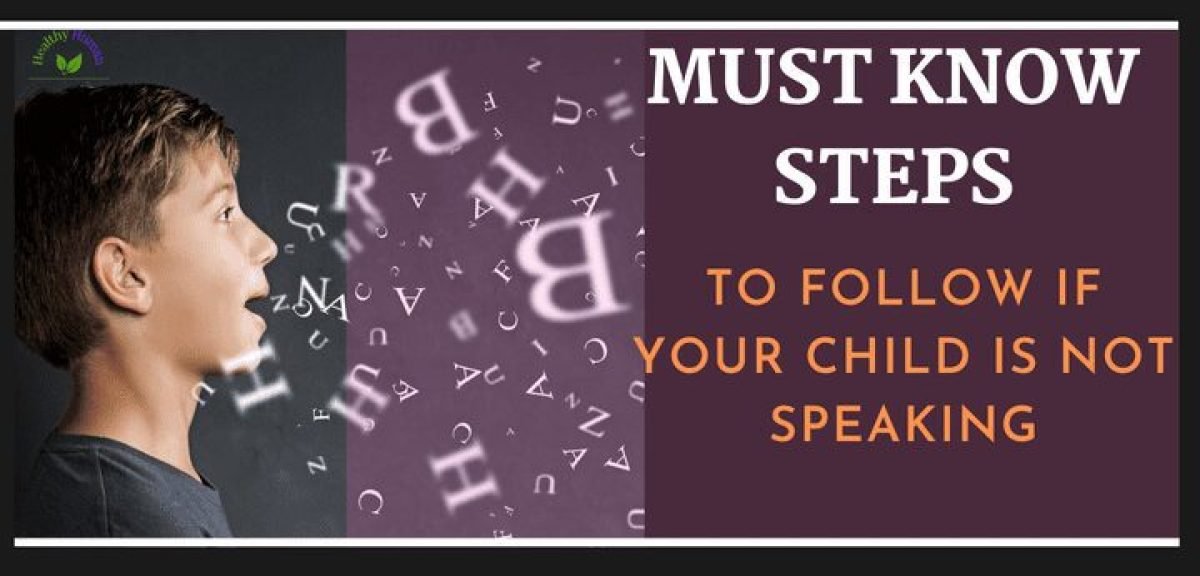It is not easy to raise children, and your workload may increase dramatically if your child is a late-talker. Improper communication becomes a reason for concern and may be very irritating for both you and your child.
As a new parent, one of the most exciting moments is when your child start talking with you. Crying, making expressing feelings, making gestures, and eventually talking are all means of communication.
What does it mean- A child is a Late Talker?
A child who talks later than expected is one whose language and communication abilities are not developing as they should. According to research, between 10 and 15 percent of two-year-olds suffer language delays, although only 4 to 5 percent of these delays persist beyond three years. Even if your child is a slow talker, there is a good chance that they will catch up in a year or two.
A language problem, which is difficulty comprehending or utilizing language, is not always present in children who are late talkers. They could develop later than other children their age and start talking later than average. Language proficiency may be enhanced by using natural therapies for late talkers in kids.
But sometimes children who are slow talkers will still experience linguistic or academic challenges as they develop. Additionally, for some children, talking later than expected is an indication of another issue, such as autism, other developmental delays, or learning difficulties.
Signs of a Late talker’s Child

A doctor should be consulted as soon as possible for a child who is a Late-talker or respond late to sounds. However, it’s sometimes challenging for parents to determine whether their kid is simply taking a little longer than usual to complete a speech or language goal or whether anything is wrong.
Here are several warning signs. In the event that your child:
- By the age of 12 months, they are not pointing or waving goodbye.
- By 18 months, the infant prefers gestures over vocalizations. unable to accurately mimic sounds and has difficulty comprehending simple spoken instructions and has difficulty comprehending spoken demands.
- At the age of two, one can only mimic speech or motions and cannot spontaneously utter words or phrases or only repeats a few sounds or sentences, and is unable to express themselves verbally beyond their immediate requirements.
- By 2 years: unable to adhere to simple instructions or has an odd speech tone (such as raspy or nasal sounding)
If your child’s speech is more difficult to understand than is typical for their age, you should also call the doctor:
- At two years old, parents and other frequent caretakers should be able to comprehend roughly 50% of a child’s speech, and at three years old, 75%.
- A child should be generally understood by the time they become 4 years old, even to those who don’t know them.
Causes Contributing Late Talking of a Child
There are several factors that might contribute to speech delays, some of which include;

Autism spectrum disorder
Children with autism spectrum disorder frequently struggle with speech and language development. Other indicators that a kid has autism spectrum disorder include language and speech regression, repetitive activities, poor social skills, poor verbal and nonverbal communication, and repeating words rather than constructing phrases or sentences.
Neurological disorders
Children with speech difficulties may have neurological diseases. Neurological issues. The muscles that are necessary or employed for speaking are impacted by neurological diseases. Such neurological conditions as cerebral palsy, traumatic brain damage, muscular dystrophy, etc. can all impact speech.
Einstein syndrome
If your child isn’t talking yet, they may have Einstein syndrome. Children with Einstein syndrome have delayed language development but are very bright in other areas of analytical reasoning or thinking. These kids ultimately catch up with speech and language roadblocks yet continue to outperform other kids when it comes to critical thinking and reasoning.
Tongue-tie
A fairly frequent ailment that causes speech delay is “ankyloglossia,” commonly known as tongue-tie. Some children suffer speech delays because they have abnormalities with their palate, mouth, or tongue.
The tongue is attached to the bottom of the mouth as a result of this disease. People with this illness find it challenging to pronounce or make certain sounds. Infants with this syndrome also have difficulty nursing.
Hearing loss
A hearing loss might cause speech difficulties in your child. They have trouble understanding others and forming coherent sentences because they have poor hearing.
When your child doesn’t appear to respond or pay attention when you try to speak to them or point things out, but they do so when you use gestures, this may be an indication that they have hearing loss or hearing impairment. Since the symptoms of hearing loss are often modest, the most obvious indicator is sometimes a language or speech delay.
Communication gap
Children find it challenging to pick up speech since they learn to talk in order to express themselves or interact with others. They might not learn to express themselves if there doesn’t appear to be any need for it.
Any kind of neglect, abuse, or lack of verbal connection can impede children from reaching developmental milestones since a child’s environment has a significant role in their growth and development.
Intellectual disabilities
Speech delays may result from the existence of an intellectual disability. It’s possible that your toddler’s failure to talk is due to cognitive issues rather than a lack of word-formation.
A child’s language and speech may also be impacted by growing up in a multilingual household. To interpret and use two languages, the child’s brain must work harder. Therefore, it could take longer for these kids to start speaking one or both of their new languages. A multilingual youngster using one language for a period is common.
Diagnosis of a Late Talker Child
A speech-language pathologist (SLP) should consulted as soon as possible if you suspect your kid may have difficulty. You can look for a speech-language pathologist on your own or request a recommendation from your doctor.
Your child’s speech and language abilities will be evaluated by the speech therapist. The speech-language pathologist will provide tests and check for developmental milestones in speech and language.
The speech therapist will also look at:
- what the kid comprehends (called receptive language)
- Child’s speech (called expressive language)
- Clarity of voice and articulation
The oral-motor condition of your kid (how the mouth, tongue, palate, etc., work together for speech as well as eating and swallowing). The speech-language pathologist could suggest speech treatment for your kid based on the test findings.
How Often Should Your Late Talker Child Be Evaluated?

Consult your pediatrician regarding any developmental worries
You should discuss your worries with your child’s physician if you have any worries about your child’s speech development. Or if they haven’t reached the communication milestones for their age group.
Hearing Assessment
Some kids experience linguistic impairments as a result of hearing problems. Children who get chronic ear infections or middle ear effusion may develop conductive hearing loss (fluid in the ear). A hearing test is a good idea to rule out any hearing issues if your kid is a late talker or has a possible language delay. Your youngster will probably require a referral to an audiologist from their GP.
Early Assistance
I strongly advise getting in touch with your neighborhood’s early intervention program to schedule an examination for your late-talking child because I was a former early intervention therapist.
Developmental Evaluation
A developmental evaluation by a specialist, such as a developmental-behavioral pediatrician, a child psychologist, or a neurologist, may be recommended by your child’s physician. This is often done if they also exhibit other delays or if an intellectual impairment or autism spectrum condition is suspected.
Language Therapy
Speech and language treatment may also be recommended for late talkers. Frequently, your child’s health insurance will cover this. Additionally, you can pay directly for speech therapy services.
Home Remedies for Late talker Child

There are some things you can do at home to assist if your baby isn’t talking yet or isn’t saying as many words as they should for their age.
Use of imitation
The first thing that comes to mind when you think of using imitation to get your child to talk is urging them to repeat anything you say. But this won’t help; it’s more effective to repeat everything they say. Adding extra words to whatever they say will encourage them to communicate more. For instance, if your toddler says “cat,” repeat “cat,” then say “beautiful black cat.”
Another strategy is to start songs or rhymes with words they say. For instance, if your child says “stars” at night, you may respond, “twinkle twinkle Little Star.
Speak slowly
Some kids, particularly those who have speech problems or are generally slow talkers, have trouble understanding a word or a portion of a word. Such youngsters benefit greatly from adults speaking slowly to them because it gives them time to comprehend what is being said and respond appropriately. When an adult speaks to a kid, it may often be helpful for them to view the adult’s face so they can understand how the sounds or words are made. To instruct them on how to produce the noises, you may also softly touch their face.
Use of phrases
Although questions receive attention, asking multiple questions at once may annoy or irritate your child. It gets worse if the line of questioning is aggressive. Because it causes them to experience performance anxiety and, as a result, fail to provide answers or responses.
Declarative comments, on the other hand, don’t call for a response. Thus, they are more successful since they relieve the child’s pressure to talk, allowing them to speak more freely. You may utilize declarative statements to interact with late talkers by saying things like, “Oh, you’re eating an apple. I love apples,” or “You’re wearing a black shirt.
Encourage social interactions
If your kid is a late talker, it’s crucial not to isolate them; instead, let them socialize with their peers. So they may progressively learn how to interact and communicate with their friends before moving on to adults.
Use of vitamins
Studies have linked a lack of vitamin D to impairments in language and speech. Giving your children vitamins and minerals, notably vitamin D (which is essential for the blood’s activities as well as the brain’s development), can not only aid in their growth but also their ability to speak and communicate.
Music
Because each kid is distinct and behaves in their own way, some children learn to talk before they begin to sing, while others learn to sing before they learn to talk. Even if your child can’t speak yet, they may sing because singing and speech are regulated in distinct areas of the brain.
Singing to them or using rhymes might be helpful when talking with them since some kids respond to music more than speaking. To assist them, you may consider writing a song about activities like eating, playing, and taking a shower. You might also sing some simple rhymes or tunes those kids can replicate.
Establish a support system for them
If your child is a late talker, try talking to people who are a part of their lives and therefore important to their development, such as their teachers, babysitters, or relatives. They may not be able to express themselves well and as a result, need people who will be able to understand them. This helps to relieve the pressure of speaking and encourages natural speech.
Using high-quality sensory experiences
Sensory integration can show to be a very useful strategy to support late talkers. This is due to the fact that children with speech impairments, particularly those who have “childhood apraxia of speech,” have brains that interpret sensory information differently.
To help your kid with speaking, you may use a variety of enjoyable activities including play dough, cotton balls, slides, swings, body sticks, water, and more.
If your child is a slow talker, try not to worry about them straight immediately. There are various natural treatments for late talkers that might hasten the linguistic development of the youngster.
One of these is always conversing with them while also presenting them with opportunities and motivations to converse. You should take their lead and strike up talks based on their current areas of interest.
Making time for one-on-one play with your child and reading aloud to them each day might help them become more fluent in the language. If they don’t already participate in any sort of regular peer-to-peer connection. You may also think about attending a playgroup or enrolling them in preschool.
Most kids who talk later than their classmates do so within a year or two. However, there is no way to predict whether your kid will catch up on their own or continue to experience speech delays. As a result, it’s crucial to seek out early assessment and treatment.
If your kid is not developing language milestones as expected, you should go to their physician and ask for a second examination or a referral for speech therapy. You can also contact your neighborhood’s Early Intervention program to request an evaluation.
Conclusion
Whether the issue is brought on by a medical condition or something else, the things you do at home and the positive reinforcement you give may help your child make enormous steps toward speaking properly, a crucial ability he or she will need to achieve in the future.
One of the most important things you can do for your child, aside from continuing to receive expert assistance, is to speak plainly to him or her on a frequent basis. Children mimic their parents, and they learn from their actions. Be patient and continue the dialogue.
Your child longs for understanding and communication. With some expert direction and care, you can contribute to making it happen.
Also read: What does Family Doctor Do




